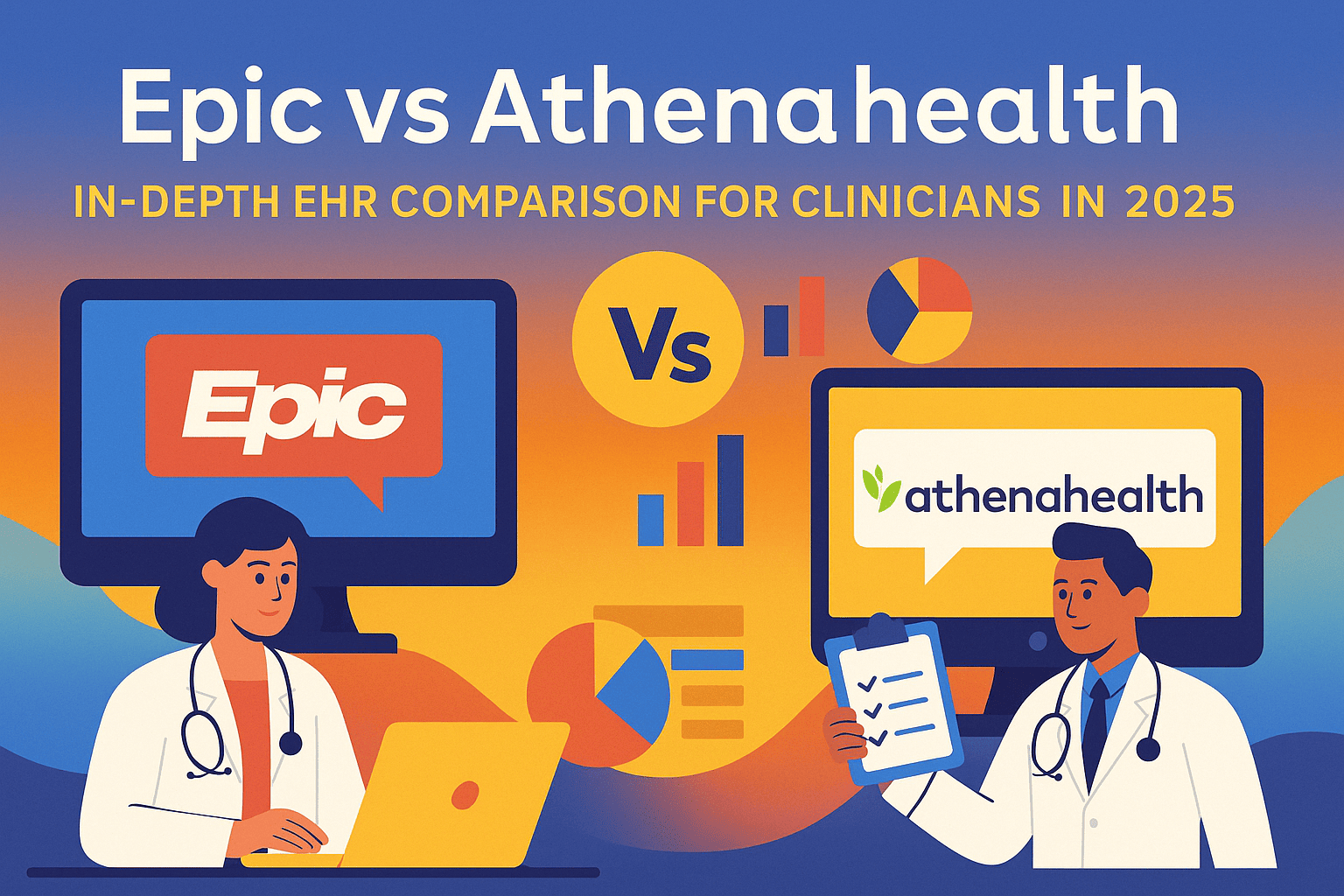Selecting the right EHR can make or break a practice—from patient care quality to revenue cycle management. This guide dives deep into Epic and Athenahealth, two leading solutions in healthcare IT, and equips you with insights to choose the best fit alongside DocScrib’s AI scribe.
📊 How They Compare: Market Position & Core Appeal
| Feature | Epic | Athenahealth |
|---|---|---|
| Target Market | Large health systems & academic centers | Small–mid sized practices & ambulatory |
| Market Share | ~30% hospital market | ~22% ambulatory clinics |
| Deployment | On-premises + cloud | Cloud-native & SaaS |
| Pricing Model | High upfront + ongoing maintenance | Subscription-based, scalable |
| User Experience | Powerful & customizable, complex setup | User-friendly, intuitive interface |
🎯 Strengths & Weaknesses Breakdown
1. Usability & Training
- Athenahealth wins for its intuitive navigation—clinicians report minimal learning curves and over 80% satisfaction with ease-of-use.
- Epic, while feature-rich, often requires extensive on-site training due to its complexity.
2. Interoperability & Data Exchange
- Epic Care Everywhere allows robust data sharing within large systems at scale.
- Athenahealth, with strong API support, leads in ambulatory interoperability and facilitates cross-platform data exchange.
3. Clinical Documentation & AI
- Epic offers embedded speech-to-text via Dragon Medical, advanced analytics, and customizable clinical tools .
- Athenahealth supports streamlined e-prescribing, voice recognition, and real-time documentation monitoring .
4. Revenue Cycle & Billing
- Epic excels at managing complex billing workflows and integrated revenue cycle tools.
- Athenahealth automates many billing processes and provides live eligibility insights, making it ideal for lean administrative teams.
5. Pricing & Scalability
- Epic investment typically starts at around $1,200 per provider per month for on-prem installs—and grows with modules.
- Athenahealth offers transparent subscription rates ($140-$200/provider/mo), making budgeting more predictable .
📸 Visual Comparison: Interface Screenshots
📈 Feature Comparison Table
| Feature | Epic | Athenahealth |
|---|---|---|
| Cloud-Based Service | Hybrid (on-prem + cloud) | Fully cloud-based |
| Patient Scheduling | Built-in, patient portal (MyChart) | Easy online scheduling, reminders |
| Billing & Claims | Extensive, integrated RCM | Automated billing, live eligibility |
| Documentation & Voice | Custom note templates, speech-to-text | Voice capture, e-prescribing |
| Analytics & Reporting | Cogito, SlicerDicer | Population health dashboards |
| Interoperability | Care Everywhere, wide network | Strong API & FHIR support |
| Customer Support | High-touch enterprise support | Responsive, cloud updates |
| Cost | High initial & support costs | Subscription model |
🎬 Expert Video Insights
- Athenahealth Interface Tour – Highlights ease-of-use, scheduling, documentation flows.
- Epic Features Rundown – Deep dive into analytics ecosystem and patient engagement.
- Choosing the Right EHR – Compares usability, cost, and ROI considerations for clinics.
🔍 Which One’s Right for You?
✅ Choose Epic if:
- You’re a large health system needing advanced customization
- You require powerful analytics and clinical decision support
- You can handle longer implementation timelines and training
- Budget allows for high upfront costs
✅ Choose Athenahealth if:
- You run a small to mid-sized clinic seeking simplicity
- You want transparent monthly pricing and faster onboarding
- Easily launching telehealth and patient engagement tools
- You value cloud infrastructure with continuous updates
🤖 Enhancing EHRs with DocScrib
No matter which EHR you select, pairing it with DocScrib’s AI scribe enhances your documentation workflow:
- Fast Voice Capture: Transforms patient dialogues into structured notes
- Auto-formatted SOAP/HPI/Discharge outputs compliant with billing requirements
- Smart completeness checks for missing vitals, follow-ups, or meds
- EHR Integration: Works with Epic, Athenahealth, Cerner, and others
- Clinician-Centric: Learns your style, improves speed and accuracy over time
Result: Cut documentation time by up to 70%, improve data quality, and boost clinician satisfaction.
📊 Implementation Comparison Chart
| Consideration | Epic | Athenahealth | With DocScrib |
|---|---|---|---|
| Setup Time | 6–12 months | 3–6 months | +2 weeks AI calibration |
| Average Cost | $1200/provider/mo+ implementation | $140–200/provider/mo | DocScrib license additional |
| Training Requirement | High (multiple onsite sessions) | Moderate (online modules) | Minimal, voice-based |
| Documentation Time | 20–40 min manually | 15–30 min manually | 5–10 min with AI |
| Billing Accuracy | High, complex workflows | Good, streamlined | AI ensures completeness |
📚 Real-World Feedback
From peer reviews:
- Athenahealth users report 90%+ satisfaction for ease and billing efficiency .
- Epic users praise its integration in large healthcare systems, but note the steep learning curve .
📝 Final Verdict
Both Epic and Athenahealth have compelling strengths:
- Epic is a powerhouse for large-scale systems with deep customization needs.
- Athenahealth offers a lean, flexible solution ideal for smaller practices and ambulatory care.
DocScrib bridges any EHR, ensuring documentation is fast, compliant, and high-quality—no matter your workflow or system.
👉 Ready to reclaim your time?Book a Free Demo with DocScrib
Learn more at DocScrib.com https://docscrib.com/
